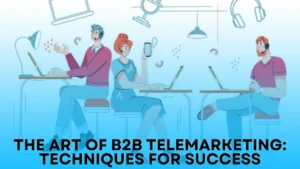In the era of big data, B2B telemarketing strategies have become increasingly sophisticated. To maximize their impact, marketers must be able to reach their ideal buyers with irresistible hooks that are sharper than Occam’s razor.
That starts with a clear understanding of their audience’s needs and pain points. It also involves knowing how to navigate common obstacles and overcome objections.
Effective Communication Skills
In a marketing landscape where many sales and marketing channels focus on automated and digital tactics, B2B Telemarketing offers an alternative that generates revenue-driving leads. By leveraging innovative scripting techniques, telemarketers can build relationships with businesses by navigating conversations and addressing objections with empathy and understanding.
Adaptability is critical for telemarketers to connect with prospects on a personal level and transcend the generic nature of their scripted calls. Active listening skills such as paraphrasing, asking open-ended questions and demonstrating empathy ensure prospects feel heard and understood by business development representatives. This helps to cultivate trust and position telemarketers as trusted business partners.
Building Rapport and Trust
B2B telemarketing requires more than just making calls. The key to success is building rapport and trust with prospects. This involves identifying their needs, providing compelling offers, and following up effectively.
The personal touch offered by a phone call allows marketers to convey nuances that are impossible to communicate via email or social media. This leads to more effective and lasting connections that fuel referrals. It also helps them build brand visibility in a world of digital noise. This makes it a critical component of any marketing strategy.
Relationship-Building Strategies
Telemarketing is not only one of the best methods for generating leads, it can also be a highly effective way to nurture those leads. Effective lead nurturing strategies include personalized follow-up emails that deliver valuable content based on what was discussed during the initial call.
Many B2B marketers mistakenly believe that because they’re marketing to businesses rather than individual consumers, there is less of a need to make their messages personal and engaging. However, this couldn’t be further from the truth. Active listening techniques like paraphrasing and asking open-ended questions help to build trust and show prospects that their concerns are being heard. This helps to establish a long-term relationship that benefits both parties.
Overcoming Objections
Maintaining professionalism even in the face of rejection or irate prospects is critical to B2B telemarketing success. Implementing team motivation strategies can help telemarketers stay composed and empathetic in challenging situations, improving customer experiences over time.
The “I’m happy with my current solution” objection is a common one that can be overcome by demonstrating how your product or service is better in some way—e.g., cheaper, more convenient, faster, or easier to use.
Overcoming sales objections requires a deep understanding of customer needs and buying behavior. Listening actively to customers and adapting content to their response is the best way to overcome objections without sounding pushy or robotic.
Best Practices for Handling Common Roadblocks
Telemarketing may seem old-fashioned in this era of advanced communication options, but it’s still a critical component for businesses looking to promote products and services and generate sales. The key is to know how and when to use the right techniques.
B2B telemarketing differs from consumer telemarketing in several ways. For example, B2B clients are typically more complex and require a deeper level of customer service to ensure that you understand their needs.
Personalization is an essential part of overcoming objections and creating meaningful conversations, laying the foundation for long-term relationships with your audience. Effective follow-up strategies, such as targeted email campaigns, can help nurture leads and stay top of mind.
Data-Driven B2B Telemarketing
B2B marketing requires a different approach than business-to-consumer (B2C) campaigns. It involves converting fellow businesses into customers, which requires strategic and personalized communication.
Using advanced technology like predictive analytics to identify the most promising leads and nurture them into customers maximizes revenue-generating opportunities. This also reduces reliance on manual, time-consuming processes.
Effective telemarketing strategies begin with targeted market research to identify gaps in demand and customer preferences. This data-driven approach allows businesses to tailor their demand generation strategy and maintain a competitive edge. Strategic follow-up communications ensures that businesses stay on prospects’ radar, increasing the likelihood of conversion. This includes sharing relevant industry insights, additional resources, and invitations to events or webinars.
Leveraging Analytics and Insights for Enhanced Performance
In a world of data-driven marketing, metrics provide the compass that guides telemarketers towards better conversion rates and increased campaign results. Using data to assess call scripts and identify common objections can improve the effectiveness of telemarketing techniques for B2B companies.
Unlike B2C audiences that buy based on emotional instincts and desires, B2B customers often make purchases based on facts and expected ROI. This is why a well-crafted message that addresses the pain points of a prospect can be so effective in enticing them to choose a particular product or service.
Similarly, effective B2B follow-up strategies can also help nurture relationships and support sales. Strategically sharing industry insights, offering additional resources, or simply checking in on prospects can strengthen your relationship and establish you as a trusted business partner.
Continuous Learning and Skill Development
Continuous learning is crucial for individuals and teams alike, helping employees stay up to date on industry trends and enabling them to fill skills gaps that may arise. It also helps foster a culture of growth and innovation, which can help boost employee engagement and retention.
Telemarketing can be mentally taxing, so it’s important to implement team motivation strategies that promote a positive work environment. Celebrating small victories and fostering a strong sense of community can be powerful ways to keep morale high.
Solo-preneurs in particular need to continuously learn to stay relevant in their field. This can be done through workshops, conferences, and online courses. It also helps to set clear learning goals that align with individual aspirations and organizational objectives.
Still Have Question About What is an Appointment Setter! Please Get Our Free Consultation: Contact Us
